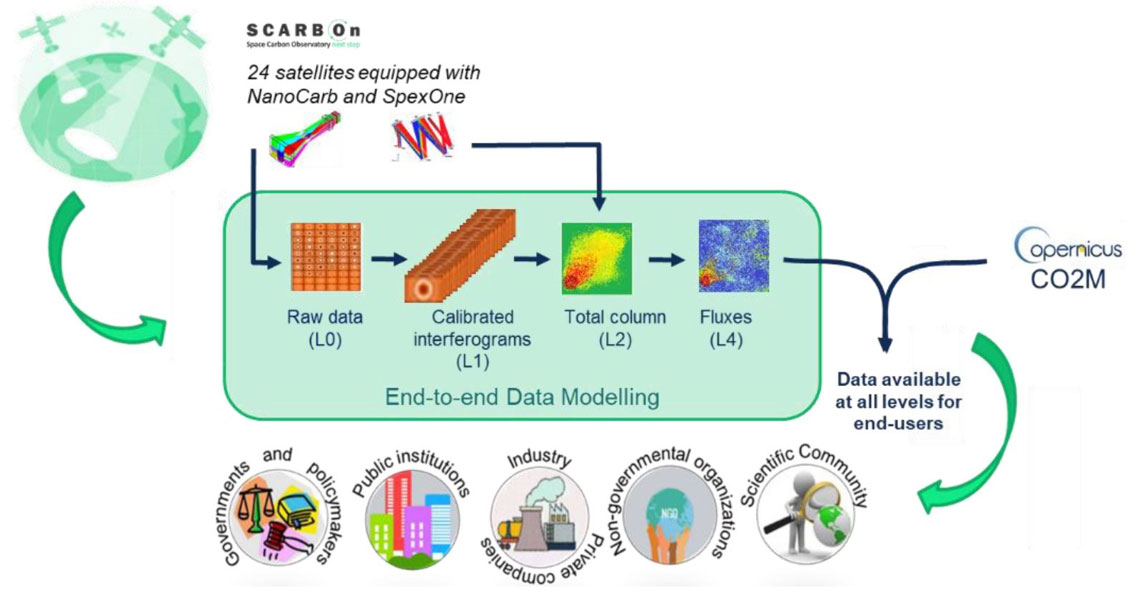The project has a background in the SCARBO (Space CARBon Observatory), also funded by the EU and executed between 2017 and 2021. The sensor test campaign with a Safire Falcon aircraft was carried out between September and October 2020 but its results, in a situation of reduced industrial activity due to the pandemic, are considered not representative. It is therefore proposed to repeat these tests within the current SCARBOn project, now counting on the air capacity of the ICGC.

Flight campaign at a coal power plant in Germany.

Network of the 10 partners of the SCARBON project.
Project partners
The consortium is made up of 10 members from 6 countries:
- France:
- Airbus Defence and Space SAS (coordinador).
- Universitat de Grenoble (UGA).
- Absolut System SAS.
- Office national d’études et de recherches aérospatiales (ONERA).
- Centre national de la recherche scientifique (CNRS).
- Netherlands:
- Airbus Defence and Space Netherlands BV.
- Czech Republic:
- Institut royal d’aéronomie spatiale de Belgique (BIRA-IASB).
- Belgium:
- Deutsches Zentrum für Luft und Raumfahrt EV (DLR).
- Catalonia:
- Cartographic and Geological Institute of Catalonia (ICGC).
SCARBON at a glance
- Title: “SCARBO next step - Space CARBon Observatory's solution to improve monitoring of GHG emissions and help establishing reliable data for emission trends forecasts”
- Total budget: 3.251.159,84 €.
- Fund: 2.842.833,63 €.
- ICGC budget: 121.422,01 €.
- ICGC funding: 121.422,01 € (100%).
- Start date: 2023.
- Expected end date: (2030).
- Consortium: 10 European partiners.
- Coordinator: Airbus Defence and Space SAS, France.
- Web: under construction.
- Programme: Funded by the European Union's Horizon programme.
- Reference: 101135301.
Expected results
The SCARBO constellation will generate reliable data to help Europa track anthropogenic CO2 and CH4 emissions with high accuracy and high revision. The routine estimation of emissions at two different times of the day is a key step towards detecting short-term changes in emissions and therefore offering fewer uncertainties about regional emissions trends than is currently achieved through bottom-up inventories.
Planned activities
The ICGC participates in two Work Packages (WP):
- WP1:Project Management and Coordination.
- WP4:NanoCarb-P. Airborne Prototyping and Demonstration.
- T4.4. NanoCarb-P Airborne Flight Tests.
This is the main field of intervention of the ICGC, among others:
- Flight planning over two zones: one in Catalonia and another in Germany.
- Obtaining national and international flight permits.
- Installation of the sensor on board the Beechcraft B200 aircraft.
- Weather control management.
- On-board operations (pilot and sensor operator).
- Execution of flights.
Funded by:
This project has been funded by the EU programme Horizon Europe (Call: HORIZON-CL4-2023-SPACE-01-11 - Strategic autonomy in developing, deploying and using global space-based infrastructures, services, applications and data 2023).

 Contact
Contact











